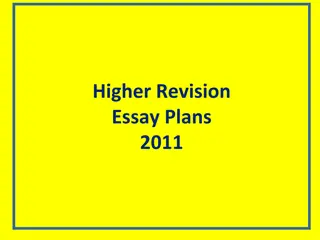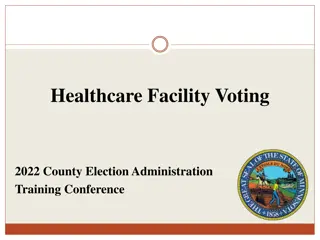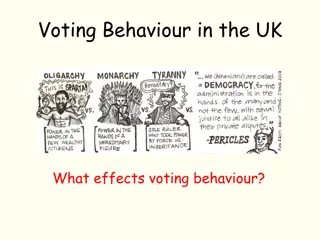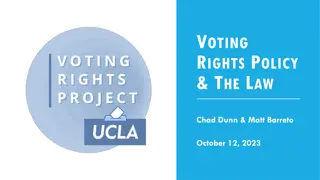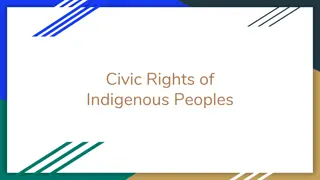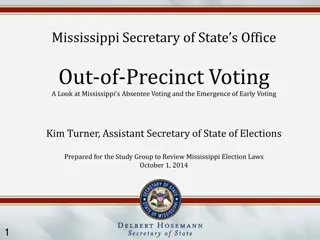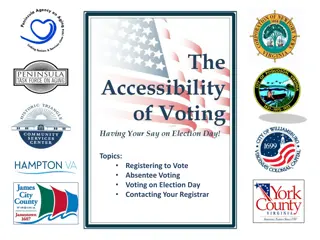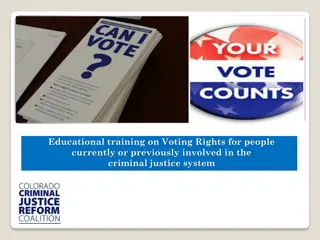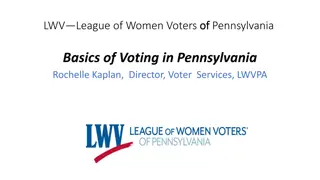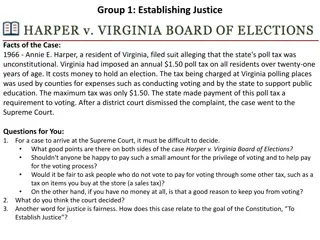Safeguarding Voting Rights Amid the Pandemic Challenges
Examining critical issues surrounding the protection of voting rights during the COVID-19 pandemic, including voter registration restrictions, disenfranchisement, limitations on in-person voting, and strategies to combat voter suppression tactics. Recent primary elections in states like Kentucky and New York highlight the challenges faced by voters, such as limited polling locations, long lines, and logistical issues. Legal battles have ensued, with concerns raised about potential violations of constitutional and voting rights laws.
Download Presentation

Please find below an Image/Link to download the presentation.
The content on the website is provided AS IS for your information and personal use only. It may not be sold, licensed, or shared on other websites without obtaining consent from the author.If you encounter any issues during the download, it is possible that the publisher has removed the file from their server.
You are allowed to download the files provided on this website for personal or commercial use, subject to the condition that they are used lawfully. All files are the property of their respective owners.
The content on the website is provided AS IS for your information and personal use only. It may not be sold, licensed, or shared on other websites without obtaining consent from the author.
E N D
Presentation Transcript
Protecting Voting Rights During the Pandemic Era Wednesday June 24, 2020, 5pm - 6:30pm Sponsored By Boston Bar Association and American Constitution Society
Protecting Voting Rights During the Pandemic Era Critical issues to examine concerning the protection of voting right during the COVID-19 pandemic include: Voter Registration How have voter registration restrictions affected voting rights? Voter Disenfranchisement How have the purge of voter rolls in various states affected voting rights? Ability to Vote - How have limitations on the ability to vote in person and remoting affected voting rights? How can we get to "no-excuse" mail-in voting, providing prepaid mail-in voting envelopes, expanding early voting and expanding number of voting locations? Voter Suppression How do we fight against voter suppression tactics such as overly restrictive voter ID laws, unreasonable witness requirements for absentee ballots, insufficient number of polling locations and poll workers, and voter intimidation at the polls?
Protecting Voting Rights During the Pandemic Era The pandemic has given way to a host of rationalizations for limiting access to polling sites across the country, concerning voting rights activists. As voters in Kentucky and New York cast ballots in primary elections yesterday, the pall of the pandemic and the specter of voter suppression created a climate of uncertainty for some who might have wanted to vote in person but questioned how they can do so safely and efficiently. Kentucky, which has had thousands of polling places in previous elections, had only 170 open on Tuesday, including a single polling place for the state s largest city Louisville - which has more than 600,000 residents. While there were no major incidents reported that prevented voting in NYS and Kentucky, there were reports of long lines, difficulty in finding parking and missing ballots.
Protecting Voting Rights During the Pandemic Era Voters waited in line to cast their ballots in the Kentucky primary. | Timothy D. Easley/AP Photo
Protecting Voting Rights During the Pandemic Era In Kentucky, a Federal Judge had ruled last week against plaintiffs, including a local Republican legislator and several voters, who claimed the drastic winnowing of polling places in the county s most populous and diverse districts violated the First and 14th amendments, as well as the Voting Rights Act of 1965 and amounted to voter suppression. The plaintiffs had requested injunctive relief to prohibit the use of a single polling location in counties with more than 35,000 registered voters. The Judge denied their request, stating his view that vast restriction of polling places in these counties didn t amount to a constitutional violation. Activists stated that restricting all of Jefferson County s voters to a single polling place still amounted to voter suppression, even though the Governor and Secretary of State previously had moved to expand mail-in absentee voting.
Protecting Voting Rights During the Pandemic Era On June 9, 2020, in Georgia, there were voting delays across the state, which led officials there to call for investigations into why voters spent hours standing in lines on a hot June day. Voting was extended at some precincts in eight counties around the state. Voting was extended to 9:30 p.m. in DeKalb County, more than two-and-a- half hours after polls were supposed to close, and at least one precinct stayed open until 10:10 p.m! Voters reported standing in the hot summer sun for upward of four hours attempting to cast their ballots. Many voters reported having to wait in line to vote after failing to receive absentee ballots they had requested to avoid the in-person threat of coronavirus. And many voters left the lines without having cast their ballots. The worst problems were reportedly concentrated in counties and localities with higher African American populations.
Protecting Voting Rights During the Pandemic Era People wait in line to vote in the Georgia s primary election at Park Tavern on Tuesday in Atlanta. Photograph: Brynn Anderson/AP Voters wait in line to vote at the Park Tavern polling place in Atlanta.
Protecting Voting Rights During the Pandemic Era A source in the Georgia Secretary of State's office reported that some counties in the state had been straining under the volume of absentee ballots that were received. While, fewer than 40,000 people typically vote by absentee ballot in Georgia, instead, the state had received more than 1.2 million absentee ballots, a primary participation record, with over 950,000 absentee ballots having been mail-in ballots. Numerous reports noted average wait times in some locations spanning three to four hours, machines not being delivered to the proper polling locations and poll workers not being given the sufficient amount of training regarding any issues that could arise.
Protecting Voting Rights During the Pandemic Era Our panelists this evening: Sophia Hall, Supervisory Attorney, Lawyers for Civil Rights; Brenda Wright, Senior Advisor for Legal Strategies, Demos; Genevieve Nadeau, Counsel, Protect Democracy; and Quentin Palfrey, former Massachusetts Lt. Governor candidate and Chair of the Voter Protection Corps.
Protecting Voting Rights During the Pandemic Era Sophia Hall joined Lawyers for Civil Rights in July 2016 and currently holds the role of Supervising Attorney. As an experienced litigator, Sophia handles a broad range of civil rights matters, actively representing people of color and immigrant women to protect their rights in the workplace and in the community. Sophia also spearheads Massachusetts Election Protection, the nation s largest nonpartisan voter protection campaign, mobilizing several hundred volunteers to provide real-time voter assistance on Election Day through a statewide hotline and field program. She is also a long-term member of the Election Modernization Coalition, a coalition of organization that have successfully fought for pro-democracy legislation to modernize the Massachusetts voting system, including campaigns for Early Voting, Automatic Voter Registration and Election Day Registration. Sophia is a graduate of Boston College Law School and holds a bachelor s degree from Emory University. She has been recognized as one of Boston s Top 25 Most Influential Millennials of Color, an Up & Coming Lawyer by Massachusetts Lawyers Weekly, and an Emerging Leader by the Women s Bar Association.
Protecting Voting Rights During the Pandemic Era Brenda Wright is Senior Advisor for Legal Strategies at Demos. She has led many progressive legal and policy initiatives on voting rights, campaign finance reform, redistricting, election administration and other democracy and electoral reform issues. Her extensive experience in federal court litigation includes two arguments before the U.S. Supreme Court: Young v. Fordice, a Mississippi voting rights case; and Randall v. Sorrell, a Vermont campaign finance case. She has written extensively on democracy and voting rights issues in both popular and scholarly publications and appears frequently in print and broadcast media on these issues.
Protecting Voting Rights During the Pandemic Era Genevieve Nadeau is a Counsel with the nonpartisan, nonprofit Protect Democracy, where she works on a variety of pro-democracy issues, including ensuring a free and fair 2020 presidential election. Before joining Protect Democracy, Genevieve spent more than seven years in the Massachusetts Attorney General s Office in various leadership roles, including as Chief of the Civil Rights Division and State Enforcement Counsel. She was responsible for leading a team charged with enforcing a wide range of state and federal civil rights laws and for litigating a variety of affirmative impact cases in state and federal court, as well as other initiatives. Genevieve also served in the Office of the General Counsel at the U.S. Department of Homeland Security and spent several years at private law firms representing clients in employment litigation and related matters. She received her J.D. from Stanford Law School.
Protecting Voting Rights During the Pandemic Era Quentin Palfrey is the Chair of Voter Protection Corps (www.voter- protection.org). Quentin has played a leadership role in voter protection programs in battleground states in numerous presidential, senatorial, and gubernatorial campaigns over the past 15 years. He was the 2004 New Hampshire voter protection director for the Kerry-Edwards campaign, the 2008 Ohio voter protection director for the Obama-Biden campaign, and has been a senior advisor to numerous voter protection programs at the national level and in Massachusetts, Virginia, Pennsylvania, and North Carolina.. During the Obama administration, Quentin served as senior advisor for jobs & competitiveness in the White House Office of Science & Technology Policy and deputy general counsel for strategic initiatives at the U.S. Department of Commerce. In 2018, Quentin was the Democratic nominee for Massachusetts Lieutenant Governor.




